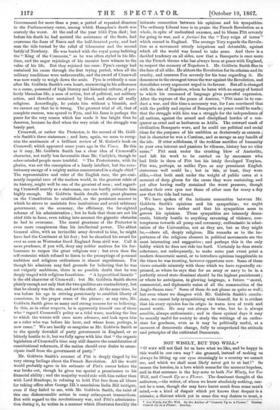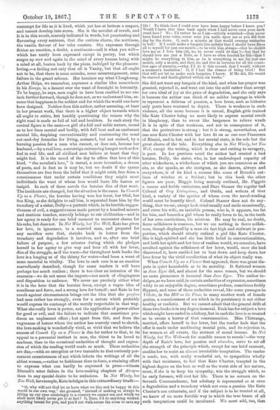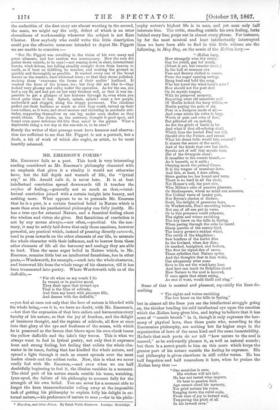NOT WISELY, BUT TOO WELL"
" 0 WHY will not God let us have what we like, and be happy in this world in our own way ? she groaned, instead of making us always be lifting up our eyes strainingly to a country we cannot see, and which we shall most likely never get to at last?" So moans the heroine, in a love which seems for the moment hopeless, and in that sentence is the key-note to both Not Wisely, but no Well, and Cornea Up as a Flower. The dominant thought of the authoress,—the writer, of whom we know absolutely nothing, can- not be a man, though she may have learnt much from some man's mind,—is a kind of despair which yet knows that despair is a mistake, a distrust which yet in some dim way desires to trust, a
• Not Wiselp,but Too Well. By the Author of "Cornett Up as a Flower." Tinsley. Oomith Up as a Flower. Dooley.
contempt for life as it is lived, which yet has at bottom a respect, and cannot develop into scorn. She is the novelist of revolt, and it is in this revolt, scarcely indicated in words, but penetrating and flavouring every sentence, that_ the curious charm, the nuttiness, the vanilla flavour of her tales consists. She expresses through
fiction an emotion, a doubt, a sentiment—call it what you will—
which has rarely been expressed except in poetry, but which surges up now and again in the mind of every human being with
a mind at all, beaten back by the pious, indulged by the pleasure- loving,—a feeling not only that all is Vanity, but that all ought not to be, that there is some mistake, some misarrangement, some failure in the grand scheme. Her heroines say what Cloughsang.
.Arthur Helps, we remember, expresses a similar idea somewhere in his Essays, in &lament over the want of foresight in humanity. To be happy, he says, men ought to have been enabled to see one inch further forward, though he does not, as we understand him, as- sume that happiness is the noblest end for which the world can have been designed. Neither does this author, rather assuming, at least in her present work, that there is a higher object towards which
all ought to strive, but harshly questioning the reason why the right road is made so full of toil and boulders. In each story the central figure is the same—a girl of a full and noble nature, round as to her lines mental and bodily, with full bust and an exuberant mental life, despising conventionality and contemning the usual cut-and-dry formulas for living, ensnared, but not stained, by a burning passion for a man who cannot, or does not, become her husband,—by a real love, a sovereign entrancing hunger such as few feel in real life, and all civilized men believe at heart that they might feel. It is the mood of the day to affirm that love of this kind, " the novelist's love," is unreal, a mere invention, a dream
of poets, and in fact so it may be, but we doubt if the cynics themselves are free from the belief that it might exist, free from a consciousness that under certain conditions they might meet individuals the want of whose love would leave life barren or insipid. In each of these novels the heroine dies of that want.
The incidents are changed, but the situation is the same. In Cometh Up as a Flower, the heroine having won her lover, her Olaf, her Sea King, as she delights to call him, is separated from him by the treachery of a sister, Dolly—a portrait which, in its terrible sugges- tiveness of evil, a suggestiveness made patent by a hundred minute and Cautions touches, scarcely belongs to our civilization—and in her agony is ready for one brief moment to encounter shame for his sake, but does not. In Not Wisely, but Too Well, Kate has given her love, in ignorance, to a married man, and prepared for any sacrifice save that, shrinks back in horror from the
treachery and degradation it involves, and so, after one brief failure of purpose, a few minutes during which she pledges herself in her agony to give way and bear all with her lover, dies of the struggle, as if the want—for throughout both books the love is a longing as of the thirsty for water—had been a want of some essential to vitality. The love in each case is as an emotion marvellously described, though for some readers it will have perhaps too much realism ; there is too clear an intrusion of the sensuous—we do not mean the impure—too much of clinginguess and disposition to embrace. We never see precisely either what it is in the hero that the heroine loves, except a vague idea of manliness and force, and a strong love for herself ; and Kate in her revolt against circumstances brings out the idea thitt she prefers bad men rather too strongly, even for a nature which probably would express its contempt of the merely respectable in that way.
What she really loves is power, not the application of power either for good or evil, and the failure to indicate that sometimes pro- duces an unpleasant effect ; but apart from this, and from the vagueness of heroes whom the author has scarcely cared to sketch,
the love-raaking is wonderfully vivid, so vivid that we believe the success of Cometh Up as a Flower is due far rather to that, to its appeal to a perennial instinct in men, the thirst to be loved to madness, than to the occasional audacities of thought and expres- sion of which the reading world made so much. These audacities are due,—with an exception or two traceable to that curiously per-
,martent consciousness of sex which infects the writings of all the ablest women,—rather to feebleness than to force, a straining effort to express; what can hardly be expressed in prose—witness
Disraeli's utter failure in the love-making chapters of Alroy- than to any special desire to be audacious. In Not Wisely, but Too -Well, for example, Kate indulges in this extraordinary tirade:— " 0, why will not God let us have what we like and be happy in this world in our own way," she groaned, "instead of making us always be lifting up our eyes strainingly to a country we cannot see, and which we shall most likely never get to at last? 0, Dare, I'd do anything wicked. anything insane for you, and you'd not walk across the room to save my. life 1 To think that I could ever have been happy before I knew you r Would I have that time back. again when I had never seen your dark cruel face ? No: I'd rather be as I am—utterly wretched—than never have heard your voice, never seen you smile upon me as you did that day by the shore. 0, such a minute ei that would overpay centuries in hell ! If I could make a bargain this miehte that I should have Zara all to myself for just one month—to be with IiimAlways—thitt he should, love me as I love him Cab, no, he never could do that !)—but that he. should love me just a little, as I have so often fancied. he did—that I might be everything to him, as he is everything to me, for. just one- month, only a month, and then die and live in tortures for all the count- less ages of eternity,—why, I'd do it this second, that I would; without a moment's hesitation ! 0, if I had the chance of being tried ! But God will not let us make such bargains, I know. If He did, life would. be starved and death-glutted within six weeks."
She did not want any bargain of the kind, and when her-prayer was- granted, rejected it, and went out into the cold rather than accept her own ideal of joy at the price of degradation, and she only says. it because the author can think of no milder language in whicla to represent a delirum of passion, a love fever, such as hitherto. only poets have ventured to depict. There is weakness in such violence, all the more because it is unreal, English girls trained like Kate Chester being no more likely to express mental revolt in blasphemy, than to swear like bargemen to relieve wrath It is in spite of that weakness, and not in consequence of it,.
that the portraiture is strong ; but it is strong, nevertheless, and one sees Kate Chester with her love fit on as one sees Francesca. of Rimini, and in her, and in her mental state, is the sole but the-
great charm of the tale. Everything else in Not Wisely, but Too. Well, except the writing, which is clear and cutting to savagery, is poor. In her previous novel the author had created a bad heroine, Dolly, the sister, who, in her undeveloped capacity of utter wickedness, a wickedness of which you are conscious as she
sits, as she speaks, as she intrigues, as she dances, always and everywhere, is of its kind a success like some of Retzch's out- lines of witches at a Sabbat ; but in this book the other figures are poor, Maggie being scarcely outlined, Mr. Piggott a coarse and feeble caricature, and Dare Stainer the regular bad Colonel of Guy Livingstone, and Oujda, and writers of that kind, a variety of the species, of whom even the novel-reading
world must be heartily tired. Colonel Starner does not do any- thing, that we see, except look cruel. sually and smile occasionally, and curse his wife, an invisible person, who is, it appears, too fat for him, and beseech a girl whom he really loves to be, in the teeth of her own convictions, his mistress. He may be real, no doubt,. fierce selfishness is common, but we see nothing in fierce selfish-
ness, though displayed by a man six feet high and stalwart in pro- portion, which should utterly enthral a girl like Kate Chester.. She is high-spirited and she has little belief in conventionalities, and both her spirit and her love of realism would, we conceive, have- revolted against the selfishness of her lover, would, once she had discovered it, have enabled her to beat down and keep down her
fever by the vivid recollection of what its object really was.
When Cometh Up as a Flower first appeared, there was great dis- pute in quiet households as to its morality. It fluttered women, as Jane Eyre did, and almost for the same reason, but we should no more pronounce it immoral than Jane Eyre. The author in- dulges, as we have said, in certain audacities of expression, sometimes. witty to an enjoyable degree, sometimes profane, sometimes feebly flippant, and some of these audacities reveal, like some passages in Villette, in the Mill on the Floss, in many another work of female genius, a consciousness of sex which in its persistency is not either healthy or realistic. But we cannot admit that the general drift of
these two books is in any degree immoral. Each has for subject a love which might have ended in adultery, but in each the love is so treated. as to create a horror of that consummation. Miss PEstrange, married, offers herself to her lover, but the reader feels that the offer is made under maddening mental pain, and its rejection is for women at all events, the sternest of moral lessons. In Not
Wisely, but Too Well—oh for sensible names to novels !—the very depth of Kate's love, her passion and abandon, serve to ,set off the strength of the principle which, except for one brief moment„ enables her to resist an almost irresistible temptation. The reader is made, too, with really, wonderful art, to sympathize wholly with that resistance, to feel that Kate Chester, tempted in the highest degree on the best as well as the worst aide of her nature, must, if she is to keep his sympathy, win the struggle which, as. he early foresees, will cost her life. There is no sermon on the Seventh Commandment, but adultery is represented as at once. a degradation and a treachery which not even a passion like Kate- Chester's can extenuate, and if the subject is to be treated at all,. we know of no more forcible way in which the true lesson of all such temptations could be inculcated. We must add, tog, that
the audacities of the first story are almost wanting in the second, the main, we might say the only, defect of which is an utter slovenliness of workmanship whenever the subject is not Kate Chester. How anybody who could write this little description could pen the offensive nonsense intended to depict Mr. Piggott we are unable to conceive :-
" But Mr. Piggott was revelling in the vision of his own many and great ailments, and her caution was unnecessary. How the rain did patter down outside, to be sure !—not coming down in slant, intermittent bursts, wind-driven, but falling steadily straight down from heaven to earth, as if bent on fulfilling its mission, and soaking the ground as -quickly and thoroughly as possible. It washed every one of the broad leaves on the sombre, dust-whitened trees ; so that they shone polished, making them 'reassume the forms of their earlier' leafhood. It washed the faces of the houses, too; but they did not like it—they looked very gloomy and sulky under the operation. As for the sea, she had a coy fit, and had put on her very thickest veil, so that it was im- possible to get a glimpse of her features through it even when you .stood quite close to her. Splash, splash, splash! went a few people, nmbrella'd and clogged, along the sloppy pavement. The chickens puffed out their feathers as much as ever they could, turned up their coat-collars, as it were, and stood morose and shivering in acrobatic atti- tudes, supporting themselves on one leg, under such shelter as they could obtain. The ducks, on the contrary, thought it good sport, and found even more delicious tid-bits than usual in the gutter. What a deplorable thing a wet day at the sea-side is, to be sure !"
Surely the writer of that passage must have humour and observa- tion too sufficient to see that Mr. Piggott is not a portrait, but a daub, a bit of work of which she ought, as artist, to be most heartily ashamed.
































 Previous page
Previous page